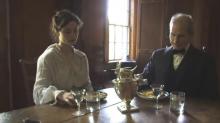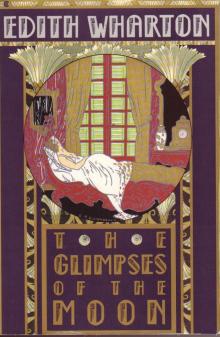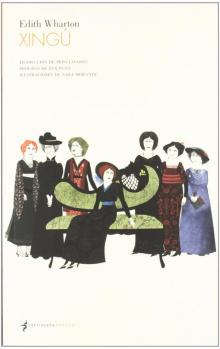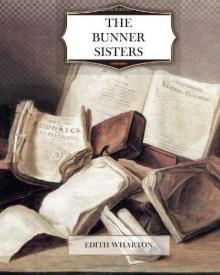- Home
- Edith Wharton
The Mission of Jane
The Mission of Jane Read online
I
LETHBURY, surveying his wife across the dinner table, found his transient conjugal glance arrested by an indefinable change in her appearance.
"How smart you look! Is that a new gown?" he asked.
Her answering look seemed to deprecate his charging her with the extravagance of wasting a new gown on him, and he now perceived that the change lay deeper than any accident of dress. At the same time, he noticed that she betrayed her consciousness of it by a delicate, almost frightened blush. It was one of the compensations of Mrs. Lethbury's protracted childishness that she still blushed as prettily as at eighteen. Her body had been privileged not to outstrip her mind, and the two, as it seemed to Lethbury, were destined to travel together through an eternity of girlishness.
"I don't know what you mean," she said.
Since she never did, he always wondered at her bringing this out as a fresh grievance against him; but his wonder was unresentful, and he said good-humoredly: "You sparkle so that I thought you had on your diamonds."
She sighed and blushed again.
"It must be," he continued, "that you've been to a dressmaker's opening. You're absolutely brimming with illicit enjoyment."
She stared again, this time at the adjective. His adjectives always embarrassed her: their unintelligibleness savored of impropriety.
"In short," he summed up, "you've been doing something that you're thoroughly ashamed of."
To his surprise she retorted: "I don't see why I should be ashamed of it!"
Lethbury leaned back with a smile of enjoyment. When there was nothing better going he always liked to listen to her explanations.
"Well--?" he said.
She was becoming breathless and ejaculatory. "Of course you'll laugh--you laugh at everything!"
"That rather blunts the point of my derision, doesn't it?" he interjected; but she rushed on without noticing:
"It's so easy to laugh at things."
"Ah," murmured Lethbury with relish, "that's Aunt Sophronia's, isn't it?"
Most of his wife's opinions were heirlooms, and he took a quaint pleasure in tracing their descent. She was proud of their age, and saw no reason for discarding them while they were still serviceable. Some, of course, were so fine that she kept them for state occasions, like her great-grandmother's Crown Derby; but from the lady known as Aunt Sophronia she had inherited a stout set of every-day prejudices that were practically as good as new; whereas her husband's, as she noticed, were always having to be replaced. In the early days she had fancied there might be a certain satisfaction in taxing him with the fact; but she had long since been silenced by the reply: "My dear, I'm not a rich man, but I never use an opinion twice if I can help it."
She was reduced, therefore, to dwelling on his moral deficiencies; and one of the most obvious of these was his refusal to take things seriously. On this occasion, however, some ulterior purpose kept her from taking up his taunt.
"I'm not in the least ashamed!" she repeated, with the air of shaking a banner to the wind; but the domestic atmosphere being calm, the banner drooped unheroically.
"That," said Lethbury judicially, "encourages me to infer that you ought to be, and that, consequently, you've been giving yourself the unusual pleasure of doing something I shouldn't approve of."
She met this with an almost solemn directness. "No," she said. "You won't approve of it. I've allowed for that."
"Ah," he exclaimed, setting down his liqueur-glass. "You've worked out the whole problem, eh?"
"I believe so."
"That's uncommonly interesting. And what is it?"
She looked at him quietly. "A baby."
If it was seldom given her to surprise him, she had attained the distinction for once.
"A baby?"
"Yes."
"A--human baby?"
"Of course!" she cried, with the virtuous resentment of the woman who has never allowed dogs in the house.
Lethbury's puzzled stare broke into a fresh smile. "A baby I sha'n't approve of? Well, in the abstract I don't think much of them, I admit. Is this an abstract baby?"
Again she frowned at the adjective; but she had reached a pitch of exaltation at which such obstacles could not deter her.
"It's the loveliest baby--" she murmured.
"Ah, then it's concrete. It exists. In this harsh world it draws its breath in pain--"
"It's the healthiest child I ever saw!" she indignantly corrected.
"You've seen it, then?"
Again the accusing blush suffused her. "Yes--I've seen it."
"And to whom does the paragon belong?"
And here indeed she confounded him. "To me--I hope," she declared.
He pushed his chair back with an inarticulate murmur. "To you--?"
"To us," she corrected.
"Good Lord!" he said. If there had been the least hint of hallucination in her transparent gaze--but no: it was as clear, as shallow, as easily fathomable as when he had first suffered the sharp surprise of striking bottom in it.
It occurred to him that perhaps she was trying to be funny: he knew that there is nothing more cryptic than the humor of the unhumorous.
"Is it a joke?" he faltered.
"Oh, I hope not. I want it so much to be a reality--"
He paused to smile at the limitations of a world in which jokes were not realities, and continued gently: "But since it is one already--"
"To us, I mean: to you and me. I want--" her voice wavered, and her eyes with it. "I have always wanted so dreadfully . . . it has been such a disappointment . . . not to . . ."
"I see," said Lethbury slowly.
But he had not seen before. It seemed curious, now, that he had never thought of her taking it in that way, had never surmised any hidden depths beneath her outspread obviousness. He felt as though he had touched a secret spring in her mind.
There was a moment's silence, moist and tremulous on her part, awkward and slightly irritated on his.
"You've been lonely, I suppose?" he began. It was odd, having suddenly to reckon with the stranger who gazed at him out of her trivial eyes.
"At times," she said.
"I'm sorry."
"It was not your fault. A man has so many occupations; and women who are clever--or very handsome--I suppose that's an occupation too. Sometimes I've felt that when dinner was ordered I had nothing to do till the next day."
"Oh," he groaned.
"It wasn't your fault," she insisted. "I never told you--but when I chose that rose-bud paper for the front room upstairs, I always thought--"
"Well--?"
"It would be such a pretty paper--for a baby--to wake up in. That was years ago, of course; but it was rather an expensive paper . . . and it hasn't faded in the least . . ." she broke off incoherently.
"It hasn't faded?"
"No--and so I thought . . . as we don't use the room for anything . . . now that Aunt Sophronia is dead . . . I thought I might . . . you might . . . oh, Julian, if you could only have seen it just waking up in its crib!"
"Seen what--where? You haven't got a baby upstairs?"
"Oh, no--not yet," she said, with her rare laugh--the girlish bubbling of merriment that had seemed one of her chief graces in the early days. It occurred to him that he had not given her enough things to laugh about lately. But then she needed such very elementary things: it was as difficult to amuse her as a savage. He concluded that he was not sufficiently simple.
"Alice," he said, almost solemnly, "what do you mean?"
She hesitated a moment: he saw her gather her courage for a supreme effort. Then she said slowly, gravely, as though she were pronouncing a sacramental phrase:
"I'm so lonely without a little child--and I thought perhaps
you'd let me adopt one. . . . It's at the hospital . . . its mother is dead . . . and I could . . . pet it, and dress it, and do things for it . . . and it's such a good baby . . . you can ask any of the nurses . . . it would never, never bother you by crying . . ."
II
Lethbury accompanied his wife to the hospital in a mood of chastened wonder. It did not occur to him to oppose her wish. He knew, of course, that he would have to bear the brunt of the situation: the jokes at the club, the inquiries, the explanations. He saw himself in the comic role of the adopted father, and welcomed it as an expiation. For in his rapid reconstruction of the past he found himself cutting a shabbier figure than he cared to admit. He had always been intolerant of stupid people, and it was his punishment to be convicted of stupidity. As his mind traversed the years between his marriage and this unexpected assumption of paternity, he saw, in the light of an overheated imagination, many signs of unwonted crassness. It was not that he had ceased to think his wife stupid: she was stupid, limited, inflexible; but there was a pathos in the struggles of her swaddled mind, in its blind reachings toward the primal emotions. He had always thought she would have been happier with a child; but he had thought it mechanically, because it had so often been thought before, because it was in the nature of things to think it of every woman, because his wife was so eminently one of a species that she fitted into all the generalizations on the sex. But he had regarded this generalization as merely typical of the triumph of tradition over experience. Maternity was no doubt the supreme function of primitive woman, the one end to which her whole organism tended; but the law of increasing complexity had operated in both sexes, and he had not seriously supposed that, outside the world of Christmas fiction and anecdotic art, such truisms had any special hold on the feminine imagination. Now he saw that the arts in question were kept alive by the vitality of the sentiments they appealed to.
Lethbury was in fact going through a rapid process of readjustment. His marriage had been a failure, but he had preserved toward his wife the exact fidelity of act that is sometimes supposed to excuse any divagation of feeling; so that, for years, the tie between them had consisted mainly in his abstaining from making love to other women. The abstention had not always been easy, for the world is surprisingly well-stocked with the kind of woman one ought to have married but did not; and Lethbury had not escaped the solicitation of such alternatives. His immunity had been purchased at the cost of taking refuge in the somewhat rarified atmosphere of his perceptions; and his world being thus limited, he had given unusual care to its details, compensating himself for the narrowness of his horizon by the minute finish of his foreground. It was a world of fine shadings and the nicest proportions, where impulse seldom set a blundering foot, and the feast of reason was undisturbed by an intemperate flow of soul. To such a banquet his wife naturally remained uninvited. The diet would have disagreed with her, and she would probably have objected to the other guests. But Lethbury, miscalculating her needs, had hitherto supposed that he had made ample provision for them, and was consequently at liberty to enjoy his own fare without any reproach of mendicancy at his gates. Now he beheld her pressing a starved face against the windows of his life, and in his imaginative reaction he invested her with a pathos borrowed from the sense of his own shortcomings.
In the hospital, the imaginative process continued with increasing force. He looked at his wife with new eyes. Formerly she had been to him a mere bundle of negations, a labyrinth of dead walls and bolted doors. There was nothing behind the walls, and the doors led no-whither: he had sounded and listened often enough to be sure of that. Now he felt like a traveller who, exploring some ancient ruin, comes on an inner cell, intact amid the general dilapidation, and painted with images which reveal the forgotten uses of the building.
His wife stood by a white crib in one of the wards. In the crib lay a child, a year old, the nurse affirmed, but to Lethbury's eye a mere dateless fragment of humanity projected against a background of conjecture. Over this anonymous particle of life Mrs. Lethbury leaned, such ecstasy reflected in her face as strikes up, in Correggio's Night-piece, from the child's body to the mother's countenance. it was a light that irradiated and dazzled her. She looked up at an inquiry of Lethbury's, but as their glances met he perceived that she no longer saw him, that he had become as invisible to her as she had long been to him. He had to transfer his question to the nurse.
"What is the child's name?" he asked.
"We call her Jane," said the nurse.
III
Lethbury, at first, had resisted the idea of a legal adoption; but when he found that his wife's curiously limited imagination prevented her regarding the child as hers till it had been made so by process of law, he promptly withdrew his objection. On one point only he remained inflexible; and that was the changing of the waif's name. Mrs. Lethbury, almost at once, had expressed a wish to rechristen it: she fluctuated between Muriel and Gladys, deferring the moment of decision like a lady wavering between two bonnets. But Lethbury was unyielding. In the general surrender of his prejudices this one alone held out.
"But Jane is so dreadful," Mrs. Lethbury protested.
"Well, we don't know that she won't be dreadful. She may grow up a Jane."
His wife exclaimed reproachfully. "The nurse says she's the loveliest--"
"Don't they always say that?" asked Lethbury patiently. He was prepared to be inexhaustibly patient now that he had reached a firm foothold of opposition.
"It's cruel to call her Jane," Mrs. Lethbury pleaded.
"It's ridiculous to call her Muriel."
"The nurse is sure she must be a lady's child."
Lethbury winced: he had tried, all along, to keep his mind off the question of antecedents.
"Well, let her prove it," he said, with a rising sense of exasperation. He wondered how he could ever have allowed himself to be drawn into such a ridiculous business; for the first time he felt the full irony of it. He had visions of coming home in the afternoon to a house smelling of linseed and paregoric, and of being greeted by a chronic howl as he went up stairs to dress for dinner. He had never been a club-man, but he saw himself becoming one now.
The worst of his anticipations were unfulfilled. The baby was surprisingly well and surprisingly quiet. Such infantile remedies as she absorbed were not potent enough to be perceived beyond the nursery; and when Lethbury could be induced to enter that sanctuary, there was nothing to jar his nerves in the mild pink presence of his adopted daughter. Jars there were, indeed: they were probably inevitable in the disturbed routine of the household; but they occurred between Mrs. Lethbury and the nurses, and Jane contributed to them only a placid stare which might have served as a rebuke to the combatants.
In the reaction from his first impulse of atonement, Lethbury noted with sharpened perceptions the effect of the change on his wife's character. He saw already the error of supposing that it could work any transformation in her. It simply magnified her existing qualities. She was like a dried sponge put in water: she expanded, but she did not change her shape. From the stand-point of scientific observation it was curious to see how her stored instincts responded to the pseudo-maternal call. She overflowed with the petty maxims of the occasion. One felt in her the epitome, the consummation, of centuries of animal maternity, so that this little woman, who screamed at a mouse and was nervous about burglars, came to typify the cave-mother rending her prey for her young.
It was less easy to regard philosophically the practical effects of her borrowed motherhood. Lethbury found with surprise that she was becoming assertive and definite. She no longer represented the negative side of his life; she showed, indeed, a tendency to inconvenient affirmations. She had gradually expanded her assumption of motherhood till it included his own share in the relation, and he suddenly found himself regarded as the father of Jane. This was a contingency he had not foreseen, and it took all his philosophy to accept it; but there were moments of compensation. For Mrs. Lethbury was undoubtedly
happy for the first time in years; and the thought that he had tardily contributed to this end reconciled him to the irony of the means.
At first he was inclined to reproach himself for still viewing the situation from the outside, for remaining a spectator instead of a participant. He had been allured, for a moment, by the vision of severed hands meeting over a cradle, as the whole body of domestic fiction bears witness to their doing; and the fact that no such conjunction took place he could explain only on the ground that it was a borrowed cradle. He did not dislike the little girl. She still remained to him a hypothetical presence, a query rather than a fact; but her nearness was not unpleasant, and there were moments when her tentative utterances, her groping steps, seemed to loosen the dry accretions enveloping his inner self. But even at such moments--moments which he invited and caressed--she did not bring him nearer to his wife. He now perceived that he had made a certain place in his life for Mrs. Lethbury, and that she no longer fitted into it. It was too late to enlarge the space, and so she overflowed and encroached. Lethbury struggled against the sense of submergence. He let down barrier after barrier, yielded privacy after privacy; but his wife's personality continued to dilate. She was no longer herself alone: she was herself and Jane. Gradually, in a monstrous fusion of identity, she became herself, himself and Jane; and instead of trying to adapt her to a spare crevice of his character, he found himself carelessly squeezed into the smallest compartment of the domestic economy.
IV
He continued to tell himself that he was satisfied if his wife was happy; and it was not till the child's tenth year that he felt a doubt of her happiness.
Jane had been a preternaturally good child. During the eight years of her adoption she had caused her foster-parents no anxiety beyond those connected with the usual succession of youthful diseases. But her unknown progenitors had given her a robust constitution, and she passed unperturbed through measles, chicken- pox and whooping-cough. If there was any suffering it was endured vicariously by Mrs. Lethbury, whose temperature rose and fell with the patient's, and who could not hear Jane sneeze without visions of a marble angel weeping over a broken column. But though Jane's prompt recoveries continued to belie such premonitions, though her existence continued to move forward on an even keel of good health and good conduct, Mrs. Lethbury's satisfaction showed no corresponding advance. Lethbury, at first, was disposed to add her disappointment to the long list of feminine inconsistencies with which the sententious observer of life builds up his favorite induction; but circumstances presently led him to take a kindlier view of the case.

 The Age of Innocence
The Age of Innocence The Reef
The Reef Summer
Summer The Glimpses of the Moon
The Glimpses of the Moon Xingu
Xingu The Fruit of the Tree
The Fruit of the Tree Fast and Loose
Fast and Loose Artemis to Actaeon and Other Verse
Artemis to Actaeon and Other Verse The Line of Least Resistance
The Line of Least Resistance The Lamp of Psyche
The Lamp of Psyche The Reckoning
The Reckoning Afterward
Afterward The New York Stories of Edith Wharton
The New York Stories of Edith Wharton The 2014 Halloween Horrors Megapack
The 2014 Halloween Horrors Megapack 'Copy': A Dialogue
'Copy': A Dialogue The Recovery
The Recovery The Fulness of Life
The Fulness of Life Early Short Stories Vol. 1
Early Short Stories Vol. 1 Tales of Men and Ghosts
Tales of Men and Ghosts The House of the Dead Hand
The House of the Dead Hand That Good May Come
That Good May Come The Buccaneers
The Buccaneers Other Times, Other Manners
Other Times, Other Manners The Hermit and the Wild Woman
The Hermit and the Wild Woman Kerfol
Kerfol The Duchess at Prayer
The Duchess at Prayer Bunner Sisters
Bunner Sisters The Choice
The Choice Madame De Treymes
Madame De Treymes Ethan Frome, Summer, Bunner Sisters
Ethan Frome, Summer, Bunner Sisters In Morocco
In Morocco The Valley of Decision
The Valley of Decision Age of Innocence (Barnes & Noble Classics Series)
Age of Innocence (Barnes & Noble Classics Series) The Angel at the Grave
The Angel at the Grave April Showers
April Showers Sanctuary
Sanctuary The Bunner Sisters
The Bunner Sisters Mrs. Manstey's View
Mrs. Manstey's View Writing a War Story
Writing a War Story The Custom of the Country
The Custom of the Country In Trust
In Trust The Triumph of the Night
The Triumph of the Night The Hermit and the Wild Woman, and Other Stories
The Hermit and the Wild Woman, and Other Stories Roman Fever and Other Stories
Roman Fever and Other Stories The Mission of Jane
The Mission of Jane The Descent of Man and Other Stories
The Descent of Man and Other Stories Coming Home
Coming Home The Touchstone
The Touchstone Early Short Stories Vol. 2
Early Short Stories Vol. 2 Edith Wharton's Verse, 1879-1919, from various journals.
Edith Wharton's Verse, 1879-1919, from various journals.